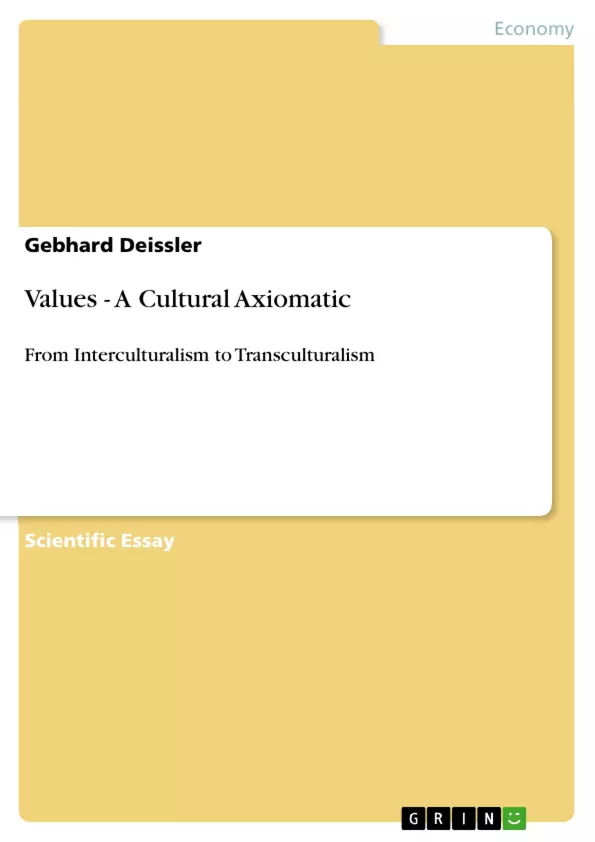English outline: Is there something we have hitherto ignored because our perception has been caught by the position (definition and description) of the cultural particle, the cultural particulars and therefore the momentum of human consciousness as a whole has eluded us? And what would be the consequence if we were creating awareness for the momentum of consciousness as a whole instead of the positioning of cultural mental particles alone? What if we were leveraging this quantum insight in intercultural research? Aren’t we trying to open a new door hitherto not only locked but not even perceived. It is a matter of pioneering this quantum cultural assumption. ---------- GERMAN:Insbesondere die Neurophysiologie, die Quantenphysik, die klassische griechische Philosophie und der Bewusstseinsforschung, sowie die höchsten Erkenntnisse der Hochkulturen diverser Zeiten und Breiten weisen auf eine für das nachhaltige Diversitätsmanagement relevante Erkenntnis hin, die offenbar im Menschen von Anbeginn potentiell angelegt war und die sich mit dem Eintritt in das globale dritte Millennium aktualisieren kann. Somit scheint die Ontogenese und die Phylogenese die Lösungen für die mit ihr einhegenden Herausforderungen bereitgestellt zu haben.
Der transkulturelle Ansatz, wie ich ihn verstehe, zeigt, wie man auch ohne quantitatives Wissen über kulturelle Profile individueller, organisationeller oder nationaler Akteure den mentalen Speicher, indem sich die sogenannte mentale Software befindet, für erfolgreiche und nachhaltige Interaktionen über kulturelle Grenzen hinweg auf individueller oder kollektiver Ebene aktivieren, deaktivieren und transzendieren kann.
Inhaltsverzeichnis (Table of Contents)
- Values - A Cultural Axiomatic
- From Interculturalism to Transculturalism
- The Axiomatic Principle and its Universal Character
- The Making of Nations and the Axiomatic Principle
- Values and the Game of Alliances
- The Dialectical Nature of Values
- Conclusion
Zielsetzung und Themenschwerpunkte (Objectives and Key Themes)
The essay explores the concept of values, their fundamental role in shaping cultural identity, and their influence on societal structures and international relations. It examines how values function as a cultural axiomatic, defining in-group and out-group dynamics and shaping alliances and conflicts.
- Values as a cultural axiomatic
- The role of values in shaping group identity and cohesion
- The impact of values on international relations and alliances
- The dialectical nature of values and their potential for conflict
- The need for a holistic understanding of values in human affairs
Zusammenfassung der Kapitel (Chapter Summaries)
- Values - A Cultural Axiomatic: This chapter introduces the concept of values as a fundamental cultural axiom that defines group membership and shapes interactions between individuals and groups.
- From Interculturalism to Transculturalism: This chapter examines the evolution of interculturalism and its limitations, arguing that a transcultural approach is necessary to address the complexities of a globalized world.
- The Axiomatic Principle and its Universal Character: This chapter delves into the universal nature of the values axiomatic, highlighting its application across diverse cultures and geopolitical contexts.
- The Making of Nations and the Axiomatic Principle: This chapter explores the role of values in nation-building and the challenges of maintaining group cohesion in the face of internal diversity.
- Values and the Game of Alliances: This chapter examines the impact of values on international alliances and conflicts, arguing that values often drive strategic decisions and shape the global political landscape.
Schlüsselwörter (Keywords)
Values, cultural axiomatic, interculturalism, transculturalism, group identity, cohesion, alliances, conflicts, dialectical nature, holistic understanding, human affairs.
Frequently Asked Questions
What is a "cultural axiomatic"?
It refers to fundamental values that serve as axioms within a culture, defining group identity and shaping how individuals perceive and interact with the world.
What is the difference between Interculturalism and Transculturalism?
Transculturalism goes beyond comparing distinct cultures; it focuses on activating and transcending mental software for successful interaction across boundaries without needing exhaustive quantitative data.
How do values influence international alliances?
Values drive strategic decisions and shape the global political landscape by defining in-group and out-group dynamics and common ground for cooperation.
What role does neurophysiology play in this research?
Insights from neurophysiology and quantum physics suggest that certain capacities for diversity management are potentially inherent in human consciousness.
What is the "momentum of human consciousness" mentioned?
It describes the holistic movement of awareness that eludes us when we focus only on specific cultural particulars or mental "particles."
- Quote paper
- D.E.A./UNIV. PARIS I Gebhard Deissler (Author), 2010, Values - A Cultural Axiomatic, Munich, GRIN Verlag, https://www.grin.com/document/159799



